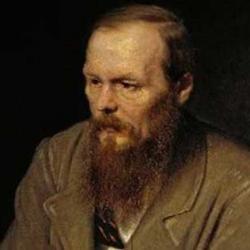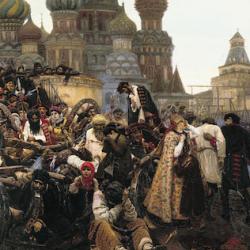Pulling together the important “content” of Rowan Williams’s profound, masterful 2008 study of Dostoevsky inevitably distorts, since much of the book consists of sensitive readings of Dostoevskian texts.
Williams begins with a text, analyzing a confession from an 1854 letter: “if someone were to prove to me that Christ was outside the truth . . . then I should choose to stay with Christ rather than with the truth.” Does this declaration unveil unacknowledged Miltonic sympathy with the devil? Is he claiming that religion is a leap into darkness, an assertion of will? Is Dostoevsky staking ground on one side of Lessing’s ditch? Does it reveal Dostoevsky as an irrationalist, an existentialist?
Each reading has defenders, and Dostoevsky has accordingly been hired on as a spokesman for all manner of trendy programmes. After examining related passages in the novels, Williams concludes that these readings do not work, and that the key is the meaning of “truth.”
If “truth” is mere fact, then Christ reveals a Truth beyond truth. If “truth” involves sanding smooth the jagged edges of human experience, Christ is outside truth. Against the truth of this world, Dostoevsky confesses Christ as the gratuitous, uncontrollable epiphany of love and joy.
The “truth” Dostoevsky opposes is diabolical. For Dostoevsky, the devil seeks closure, freezes humanity in a rational order, stops history, and any aesthetics or politics that promises an end to striving is demonic. Dostoevsky exorcises demons not to defend the individualistic freedom of self-assertion (which eventually paralyzes) but the freedom of rightly oriented desire.
Behind this analysis of the diabolical stands Dostoevsky’s famed “dialogism,” uncovered by Bakhtin. Demonic “truth” denies the other the freedom of his otherness, and also imprisons the self because each partner in dialogue finds his own voice and visibility in the vulnerability of speaking and giving others leave to speak. Freedom is freedom in language, hence freedom in communion. Dostoevsky’s is an “iconic” ethics that regards the other as a real presence of transcendent plenitude and as an occasion for “exchanging crosses,” for taking up responsibility of all for all. Eschatology underwrites and unites Dostoevsky’s convictions about desire, diabolism, language, and freedom because eschatology refuses every final word yet affirms that life has meaning to those who love while longing for Christ’s future kingdom.
Far from being skeptical or indifferent toward religion, Dostoevsky’s novels are rooted in “a sort of theology” (p. 5), and that theology shapes his fictional craft. Dostoevsky allows his characters liberty to speak and constructs plots that dissolve happily-ever-afters. This is neither a secularizing nor an apologeticizing of the novel, but an eschatologically organized Christian fiction.
If the theology that Williams finds in Dostoevsky seems suspiciously close to Williams’ own, that is as likely the result of Dostoevsky’s influence on Williams as Williams’ unconscious monologism. Still, I have the same reservations about Williams as about Bakhtin, on whom he often relies. Dialogism granted, yet in Dostoevsky’s own descriptions of his work, he frequently explains that he has a point to make. He bitched about censors removing the overtly Christian portions of Notes from Underground, and he viewed the Father Zossima section of Brothers Karamazov as a “response” to Ivan – “non-Euclidian,” but still a response.
Williams knows this, but he instinctively makes Dostoevsky’s work less didactic than the author intended. Dialogism granted; yet it remains the case, as Williams knows, that there is an ultimate monologism, the One Word of the One God, who has not been silent.










